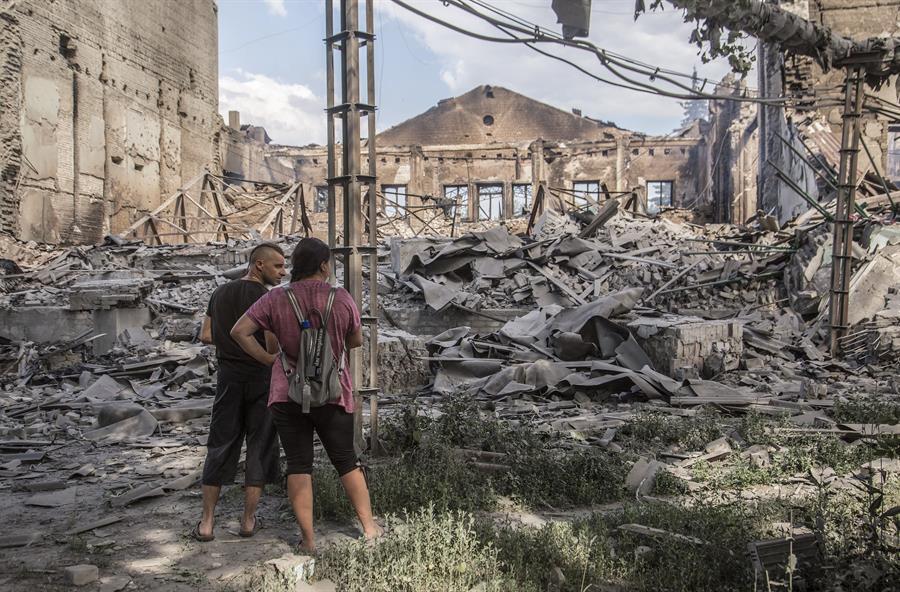
The Ukrainian army retreated from the strategic city of Lysychansk on July 3, as Russia claimed a major victory by seizing control of the entire eastern Lugansk region.
The Ukrainian withdrawal followed weeks of fierce fighting and marked a decisive breakthrough for Moscow’s forces more than four months after their invasion and after turning their focus away from the capital Kyiv.
Lysychansk had been the last major city in the Lugansk area of the eastern Donbas region still in Ukrainian hands and this frees up Moscow’s forces to advance on Kramatorsk and Sloviansk in neighbouring Donetsk.
President Volodymyr Zelensky had earlier denied Russian claims of Lysychansk’s fall before the Ukrainian army announced the retreat on Sunday evening.
"The continuation of the defence of the city would lead to fatal consequences" in the face of Russia’s superiority in numbers and equipment, the army said in a statement.
"In order to preserve the lives of Ukrainian defenders, a decision was made to withdraw.
"Unfortunately, steel will and patriotism are not enough for success -- material and technical resources are needed."
Russian forces seized Lysychansk’s twin city of Severodonetsk last week following weeks of intense fighting.
The latest blow to Ukrainian resistance came after Australian Prime Minister Anthony Albanese on Sunday pledged further military support including armoured vehicles and drones during a meeting with Zelensky in Kyiv.
In an address late Sunday, Zelensky vowed Kyiv would fight on and ensure the military had "the most modern weapons".
"It requires many negotiations, but we will ensure such a supply. Ukraine will reach the level when the fire superiority of the occupiers will be leveled."
On Sunday, Russia accused Ukraine of firing three cluster missiles at the city of Belgorod near the Ukrainian border, which came after Belarus on Saturday said it had intercepted Ukrainian missiles.
In what would represent an escalation of the conflict, Moscow said its anti-aircraft defences shot down three Tochka-U cluster missiles launched by "Ukrainian nationalists" against Belgorod.
Belgorod governor Vyacheslav Gladkov said 11 residential buildings and 39 houses had been damaged.
Russia has previously accused Kyiv of conducting strikes on Russian soil, particularly in the Belgorod region.
On Saturday, Belarusian leader Alexander Lukashenko accused Kyiv of provocation and said his army intercepted missiles fired at his country by Ukrainian forces "around three days ago".
Belarus, a Russian ally, supported the February 24 invasion and has been accused by Kyiv of launching its own attacks on Ukrainian territory.
Lukashenko denied any involvement in a recent cross-border incident.
"We do not intend to fight in Ukraine," he was quoted as saying by state news agency Belta on Saturday.
Elsewhere, the mayor of Sloviansk, 75 kilometres (45 miles) west of Lysychansk, reported the heaviest Russian shelling "for a long time".
Zelensky Sunday evening said a nine-year-old child had been among six people killed in Sloviansk, with around another 20 people wounded, as "the Russian army once again brutally shelled" the city, as well as Kramatorsk and Kharkiv.
The city of Siversk, 30 kilometres west of Lysychansk, saw overnight shelling, residents and an official told AFP.
"It was intense, and it was shooting from all sides," said a woman sheltering in a cellar.
A strike on the town of Dobropillia killed two people and wounded three, including two children, Donetsk authorities said.
Russian forces "have now gathered their largest firepower in Donbas, and they can use tens of thousands of artillery shells every day on one section of the front," Zelensky said.
But Ukrainian troops had progressed in the Kharkiv and Kherson regions, he added, vowing that "there will be a day when will say the same about Donbas."
"We will rebuild the walls, we will win back the land, and people must be protected above all else."
A Ukrainian official said on Sunday Kyiv’s forces had seen another success in Melitopol where they had "put out of action" a Russian military base, while the army said the air force had destroyed around 20 Russian units and two ammunition depots.
"The town of Melitopol is covered in smoke," said the city’s exiled mayor Ivan Fedorov.
Four months into the war, Ukraine has seen devastating destruction across some 10 regions.
On Monday, leaders from dozens of countries and international organisations are to gather in the Swiss city of Lugano for a conference on Ukraine’s reconstruction.
The aim is to provide a roadmap for the war-ravaged country’s recovery, expected to cost hundreds of billions of dollars.
Ukraine will also face demands for broad reforms, especially in cracking down on corruption after Brussels recently granted Kyiv candidate status in its push to join the 27-member bloc.
Britain has already said it will commit its long-term support to Ukraine at the conference, with Foreign Secretary Liz Truss due to pledge both immediate humanitarian assistance as well as access to British financial and economic expertise, the foreign office said.
She will tell delegates that Ukraine’s recovery "will be a symbol of the power of democracy over autocracy", it added.